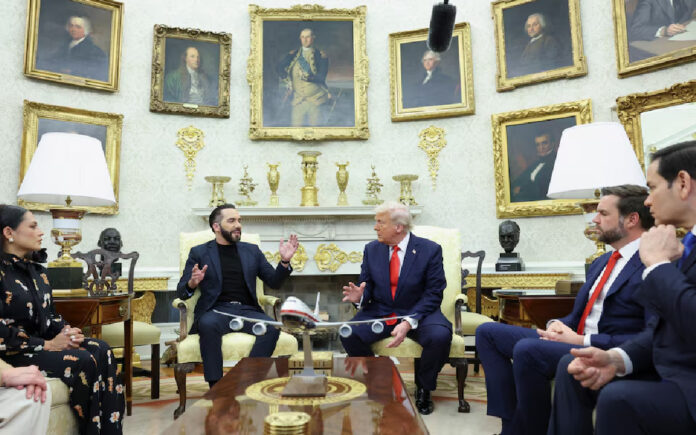Washington: El Salvador President Nayib Bukele has publicly refused to return Kilmar Abrego Garcia, a Salvadoran man mistakenly deported by the United States, asserting that doing so would be akin to “smuggling a terrorist” back into the country.
The controversial statement was made during a meeting at the White House with former U.S. President Donald Trump and members of his administration. Despite a U.S. Supreme Court order directing the Biden administration to “facilitate and effectuate” Abrego Garcia’s return, Trump-era officials signaled no intention to comply with the mandate.
Abrego Garcia, who had lived in the U.S. since 2011 and held a valid work permit, was deported to El Salvador on March 15. His case has ignited legal and political tensions over the separation of powers, immigration enforcement, and international cooperation. While U.S. officials labeled the deportation an administrative error, court documents and statements made during the Oval Office meeting suggest the Trump administration is deliberately avoiding compliance with the ruling.
El Salvador President Nayib Bukele says he has no plans to return a man mistakenly deported from the US, suggesting that doing so would be like smuggling a terrorist https://t.co/C678ILvOK0 pic.twitter.com/H5NdFDMq5U
— Reuters (@Reuters) April 15, 2025
In a Monday court filing, a U.S. Department of Homeland Security official stated the agency “does not have authority to forcibly extract an alien from the domestic custody of a foreign sovereign nation.”
Bukele maintained that he does not have the power to return Abrego Garcia to the U.S., saying, “The question is preposterous. How can I smuggle a terrorist into the United States?” His comments echoed the Trump administration’s assertion that Abrego Garcia is affiliated with the MS-13 gang—an allegation his attorneys firmly deny, citing a lack of credible evidence.
Attorney General Pam Bondi remarked during the meeting that the U.S. “needed only to provide a plane” if Bukele were willing to return the deportee. However, Bukele remained unmoved, reinforcing the Salvadoran government’s stance.
Mega-Prison Controversy and U.S. Funding
El Salvador has received $6 million in U.S. funds to support housing deported migrants, many of whom are allegedly gang-affiliated, in a high-security facility known as the Terrorism Confinement Center. Critics argue that the prison, central to Bukele’s hardline anti-gang strategy, has been involved in serious human rights abuses, including mass detentions without due process.
Trump praised Bukele’s approach, promising to send more undocumented migrants to El Salvador and assist in building additional prison infrastructure. On Saturday, the U.S. deported 10 more individuals it claims are affiliated with gangs.
Also Read | Trump Media Faces $105M Short Bet from Qube Hedge Fund
During the Oval Office exchange, Bukele responded to criticisms over his mass detentions: “I like to say that we actually liberated millions.” Trump reacted positively, asking, “Do you think I can use that?”
Despite international criticism, the State Department recently downgraded its travel advisory for El Salvador to its lowest level, citing a drop in gang-related violence—credit largely attributed to Bukele’s policies.
Legal Standoff and Tuesday Hearing
Abrego Garcia had previously been granted protection from deportation by an immigration judge who concluded he would face violence if returned to El Salvador. The Supreme Court upheld a lower court decision instructing the administration to facilitate his return, though it noted the term “effectuate” might exceed the district court’s authority.
A hearing is scheduled for Tuesday before Judge Paula Xinis, who is expected to examine whether the Trump administration deliberately influenced El Salvador to deny the man’s return. Legal scholars have raised the concern that such actions could amount to defiance of a court order.
Also Read | Sean Combs Faces Five-Count Federal Indictment, Pleads Not Guilty
George Mason University law professor Ilya Somin commented, “All that is total claptrap as applied to a case like this, where the only reason why the foreign country is holding the person is because the U.S. pushed them to do it and made an agreement under which they would do it. It’s very obvious that they could get him released if they wanted to.”
Despite the escalating controversy, Trump stated Friday that his administration would comply if the Supreme Court issued a direct order to return the man.



